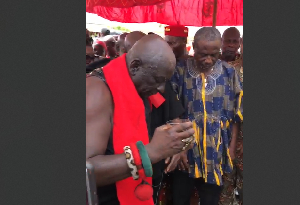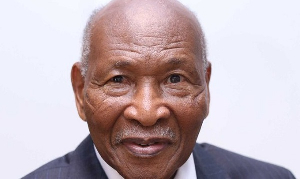Opinions of Thursday, 27 April 2006
Columnist: Ocran, Kobbi V. Kra
Governance 101: Prioritising National Needs for an Optimal Outcome
Fellow countrymen and women, our nation?s leaders have failed. Their failure is manifested in the inability to institute transparent policies and national development. The socio-economic and political management of the nation is disappointing. I think it is critical that we begin to think about ways to redeem our nation. Let?s shed our loyalties for political personalities and examine the best way to carve out a better future from the present. I propose that we go back to the drawing board and start things anew. Our economic, social and political models have recorded depressing grades on performance. The nation's economy has shrunk to less than 20 percent of what it used to be after independence; our social ethos is presently premised on intolerance and open condescension; and our national politics has descended into muddy skirmishes with deep-rooted corruption and zero-sum antics. I hope that future leaders will read some of these ideas put forward courtesy Ghanaweb (what will we do without you). Due to space constraint(s), I?ll be concise in outlining my points on national governance and development. Our Regions Future administrations must devolve the management of the regions to locally elected officials. While the stated exists in theory, it has failed to empower the periphery. Implementing true devolution will allow citizens to elect fellow citizens who have their interests at heart. It is also important that citizens must have and exercise their right to recall elected officials for non-performance and claims of corruption. While the recall of elected officials may exist in theory, it has not worked well for the people. It is therefore important that we change the rules of recall in a bid to integrate dedicated politicians in local politics and regional development. While I do not have all the answers to national problems, I am of the opinion that the nation?s political experts in collaboration with the public can help develop a workable system. Through the process of power devolution, the regions must also be able to implement revenue-generating arrangements, extract local resources and to determine what projects best suit their local needs. National budgetary allocations should be apportioned according to the needs and size of the population and not what constituency voted for what party (i.e. the politics of no vote, no development). The nation must abolish the existing two-tiered system, which allots government resources to the South and consigns the North to the mercy of Non-Governmental Charities. I am not advocating the break-up of Ghana, but the transfer of power and management to the periphery. I believe this can be done through inter-regional dialogue and a referendum. Our Constitution The nation?s constitution does not reflect modern governance. It is a nuance legal document that entrenches elitism without accountability. It is therefore imperative that we re-examine it and remove clauses that shield the leadership from criminal prosecution where claims of malversations are substantiated. The nation?s constitutional law must not condone the duplication of ad hoc laws. The Supreme Court must not remain the sole supreme institution in the interpretation of the law. It must be constrained by a constitutional clause that prevents the unnecessary deployment of political pretexts and pretences to reject parliamentary laws which disfavour the political elite. This special constitutional provision must be based on genuine democratic principles and their fundamentality in building a viable democratic state with institutional checks and balances. The constitution must contain the "Right of Initiative" a stipulation that allows voters to call for amendment to and an introduction of new clause(s) into the constitution. Thus, partial revisions of the constitution could be made any time to stave off political stalemates and the abuse of power at and by the centre. The nation?s constitution must allow the transfer of most central powers to the periphery and the governed. This is important in demystifying political elitism and the aura of personalized demi gods and goddesses; governing our nation. The constitution must enforce a provision for all parliamentary and executive business to be translated into local languages; this should be undertaken as close to real time as technologically and linguistically possible. Such provision would allow citizens irrespective of tribe, clan and educational background to get involved with national issues; the sole use of English in politics at higher level, is disenfranchising most of our citizens of their basic political rights.
Judiciary
The nation?s judiciary, a carryover of colonialism must be reformed into a transparent, robust, more representative; veraciously independent and respected arm of the state in matters of national arbitration and social justice. Supreme Court judges whose actions bring the law into disrepute must be compelled to vacate their seats and replaced with dedicated and exuberant judges. Supreme Court positions must be opened to all qualified judges. Those whose names are short-listed must be subjected to an excruciating vetting process before their approval by a multi-partisan parliament.Law and Order
A judiciary must not shy away from its fundamental responsibility to applying punitive measures as dictated by the law. In present day Ghana, the absence of uniformity in sentencing guidelines leaves culprits at the mercy of the nation?s bribe-prone judges. While some sentences may fit the crime, others are a mockery of the justice system. The disproportionality in sentencing and the lack of corrective recourse to reverse injustice breaches the rights of citizens to fair arbitration in the court of law. It is against these catalogues of arbitrary sentencing and their economic implications on national budget that I call for expert discussion on sentencing reform.This reform must allow the imposition of life in prison for cases such as rape, murder, the defiling of minors, armed robbery and drug trafficking. It is also important that the nation depoliticizes the police service and remould and make it impervious to external interferences. The duplicitous SFO and BNI must be transformed into an unified FBI-style institution to investigate all serious crimes in collaboration with regional police forces but not in competition. These new investigative bodies must only be accountable to parliament, overseen by the Vice President and their operational and tactical decisions undertaken by qualified and competent Directors.
Land Reform
To promote national development, the nations? land administration must be overhauled. The stated should be done in consensus with landowners, the government, chiefs, tribal heads, family heads and civil organisations. Nations need land for growing food, constructing roads, building dams and factories, recreation and homes; our land need to be managed well for future descendants. It?s for these reasons that land use for national good should over rule tribal needs. The convolution of effort required to achieve sustainable development, coupled with the challenges in establishing a good land policy aimed at increasing access and tenure to land, call for robust partnerships among citizens and government. These challenges should represent an appeal to all stakeholders to become allies in strengthening Ghana?s resource opportunities and consequently the capacity of citizens to develop sustainable livelihoods from the land.The first step in this collaborative process should involve the establishment of neutral forum(s) at district, regional and national levels to guiding this process. Forum should use their collective experiences and effort in convening stakeholders to address complex, and often difficult, land-management issues currently facing our nation. Without proper land administration guided by strong, fair and effective laws, future investors both homegrown and foreign (including the few we currently have) would disappear. The use of English must not determinate attendance and deliberation at a forum. The government must bear the cost of translating (verbal and written) all suggestions and agreements into local languages. There should be statutory provisions for land use, adequate pricing and compensation. This would allow easier and faster means of securing land for national, regional, rural and private development guaranteeing a win-win situation for all.
Education and Training
The nation?s educational system must place greater emphasis on technical, scientific, business management and agricultural knowledge. These four areas of education, among a list of others, form the bedrock of national economic development and progress. The nation must also provide free and quality education; one that takes into consideration the changing needs of the country and the clamour for development and growth. To effectuate these stated goals, the nation must make education accessible to its young citizens. While some may question the economic sustainability of my educational proposal, I believe that the government could save cost and raise the needed revenue by eliminating most ministerial allowances and benefits, and duplicitous agencies with no verifiable levels of productivity. Funding education to groom the nation?s future leaders must remain the state?s moral categorical imperative. Besides leadership, productive education saves the nation the cost of importing foreign expertise for solutions that could be homegrown. In partnership with the private sector, the government must offer generous tax incentives to businesses that train and offer internships to students.Telecom
The state must shed its monopoly on the Telecommunication sector. In privatising this sector, the state must give priority to Ghanaian citizens with verifiable capital and expertise. An efficient telecommunication sector is key to corporate development and modern life and convenience. Amid government regulations, the state must avoid unnecessary interventions and revised protectionisms and instead allow competent private businesses to operate. In the spirit of corporate and capitalist reciprocity, the state must demonstrate its readiness to use statutory instrument(s) to protect private investment from undue interferences from public officials and state entities. The state must leave the market to the forces of supply and demand and tax corporate profits within the framework of a reasonable and functional tax system. These corporate friendly policies will protect genuine investors and allow innovative businesses to flourish.Agriculture
The nation must revisit an agro-policy that promotes self-reliance and food security (i.e. growing what we eat and eating what we grow). Diversifying the agro-sector will reduce the nation?s dependence on cocoa. In partnership with the private sector, the government must support and fund irrigation technology to supply water to farming communities. Irrigation is a better alternative to allowing 90 percent of the nation?s fresh water flow into the sea.Taxation
The nation?s tax system must encompass revenue generation sectors such as personal income, property, business and indirect taxation etc. Expanding the tax landscape will enable the government to accrue the necessary revenue to undertake its constitutional duties such as providing adequate services for the nation. Personally, I support the introduction of Diaspora taxation, after all when we go home we enjoy certain basic benefits such as using the nation?s roads. I recommend that the government institute a Diaspora tax system ranging from US$50 to US$ 300 per annum and per every adult citizen who lives outside Ghana and holds a Ghanaian nationality. This is just a provisional proposal awaiting alternative suggestions. Holding the nation?s super rich to their tax obligations to the nation will encourage others to commit to paying what is rightfully everyone?s share of costs involved in keeping the nation functioning. As an extension of this stated policy, the government must institute programs to educate citizens on the need and benefits of taxation in national developmentInfrastructure
Ladies and gentleman, Ghana need roads, power plants, good drinking water, waste management and a list of public infrastructures that serves public interests. The nation?s enormous needs are a result of years of abandonment of productive policies, under investment, corruption and a pervading mindset that adulates the symbolic changes. Limited national resources should not stop the nation from acquiring infrastructure. Sometimes it is important to borrow to initiate programs that cater to the developmental needs of our nation. Borrowing is not a bad thing. Most governments borrow. The world?s biggest borrower is the US government. How much a nation borrows is not important. What is more important is how effectively it used in achieving the intended goals. With a pragmatic economic and legal framework that encourages private sector investment, the nation can repay its loans with little or no economic aggravation.The state must also encourage investment in the Build-Operate-Transfer (BOT) sector. This policy gives investors the opportunity to finance, design, construct, and operate state owned facilities for a specified period after which ownership is either renegotiated with the original investor, new investor or returned to the state for outright sale; it is not the business of the state to run businesses. This proposition absolves the state from extraneous costs such as operations and maintenance.
Accountability
The government must reform the Auditor General?s Office by equipping, training and turning the unit into a national watchdog institution over financial impropriety. The Audit Office must have the authorization to audit the finances of government departments and agencies. It must also report state expenditures to parliament. Records on public expenditures must be made available to all without the bureaucratic constraints except where parliament determines and directs otherwise. Citizens must be able to challenge such denial of information in the courts where appropriate; this prevents any parliament where the government of the day has a majority from abusing this system of accountability.These are my personal proposals for a new Ghana. Let us all discuss them in detail as committed citizens. Nation building is like a scientific experiment; the scientist(s) cannot build a simulation model until he or she defining exact parameters of the experiment. These above mentioned ideas should be our parameters if Ghana is to develop an economic model that works for us as nation. Why are other countries leaving us behind? The answer is, those countries have one thing in common; they all have well defined parameters for their economic development.
Nation building is no one-man job; it is teamwork with the executive, judiciary, legislators, law enforcement agencies and the governed as team members.
These suggestions are in support of many who have called for public debate on pressing national issues. If not for ourselves at least, let?s do it for our children. My dad once said clever people learn from their mistakes, but wise people learn from other people?s mistakes. Let?s learn from the mistakes of our failed leaders.
My special thanks a hard working editor. Editing my writing into this lucid material for all to easily understand. She is a gem in her own right with priceless writing ability.
Let me end with a quote by Christian Nestell Bovee, author born in New York City, 1820
?The grandest of all laws is the law of progressive development. Under it, in the wide sweep of things, men grow wiser as they grow older, and societies better.?













